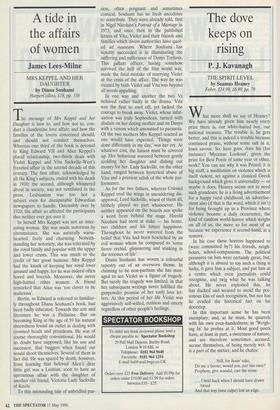A tide in the affairs of women
James Lees-Milne
MRS KEPPEL AND HER DAUGHTER by Diana Souhami HarperCollins, £18, pp. 338 The message of Mrs Keppel and her Daughter is how to, and how not to, con- duct a clandestine love affair; and how the families of the lovers concerned should, and should not conduct themselves. Whereas one third of the book is devoted to King Edward VII and Alice Keppel's placid relationship, two-thirds deals with Violet Keppel and Vita Sackville-West's frenzied affair in the second decade of this century. The first affair, acknowledged by all the King's subjects, ended with his death in 1910; the second, although whispered about in society, was not ventilated in the press. Lesbianism was too hot a subject even for disreputable Edwardian newspapers to handle. Ostensibly over by 1920, the affair so affected the participants that neither ever got over it.
In herself Mrs Keppel was not an inter- esting woman. She was made notorious by circumstance. She was naturally warm- hearted, lively and charming. Notwith- standing her notoriety, she was tolerated by the royal family and popular with the upper and lower crusts. This was much to the credit of her good humour. Mrs Keppel had the knack of keeping her royal lover amused and happy, for he was indeed often bored and boorish. Moreover, she never high-hatted other women. A friend remarked that Alice was 'too clever to be malicious'.
Bertie, as Edward is referred to familiar- ly throughout Diana Souhami's book, had been badly educated. Towards the arts and literature he was a Philistine. But on becoming King at the age of 59 his natural shrewdness found an outlet in dealing with crowned heads and presidents. He was of course thoroughly conventional. He would no doubt have supposed, like his son and successor, that buggers when found out would shoot themselves. Sevetal of them in fact did. He was spared by death, however, from learning that beloved Alice's dear little girl was a Lesbian, soon to have an uproarious affair with the daughter of another old friend, Victoria Lady Sackville of Knole.
To this astounding tale of unbridled pas- sion, often poignant and sometimes comical, Souhami has no fresh anecdotes to contribute. They were already told, first in Nigel Nicolson's Portrait of a Marriage in 1973, and since then in the published letters of Vita, Violet and their friends and families which divers authorities have quot- ed ad nauseam. Where Souhami has notably succeeded is in illuminating the suffering and sufferance of Denys Trefusis. This gallant officer, having somehow survived the hell of the first world war, made the fatal mistake of marrying Violet at the crisis of the affair. The way he was treated by both Violet and Vita was beyond all words appalling.
In one way and another the two Vs behaved rather badly in the drama. Vita was the first to cool off, yet lacked the courage to break away. Violet, whose infat- uation was truly Sophoclean, turned with disdain on her doting mother and on Denys with a venom which amounted to paranoia. Of the two mothers Mrs Keppel reacted as one would have expected. 'Things were done differently in my day,' was her cry. At whatever cost, the liaison must be covered up. Her behaviour wavered between gently scolding her daughter and dishing out money for her. Lady Sackville, on the other hand, ranged between hysterical abuse of Vita and a prurient relish of the whole per- formance.
As for the two fathers, whereas Colonel Keppel trod the wings in smouldering dis- approval, Lord Sackville, wisest of them all, blithely played no part whatsoever. He neither appeared on the boards nor spoke a word from behind the stage. Harold Nicolson had most at stake — his home, two children and his future happiness. Throughout he never wavered from the belief that Vita had been bewitched by an evil woman whom he compared to 'some fierce orchid, glimmering and stinking in the recesses of life'.
Diana Souhami has woven a colourful tapestry out of an overwom theme. In claiming to be non-partisan she has man- aged to see Violet as a figure of tragedy. But surely the tragedy was limited, in that her subsequent writings never fulfilled the gunpowder promise of her early love let- ters. At this period of her life Violet was aggressively self-willed, ruthless and utterly regardless of other people's feelings.


































































 Previous page
Previous page